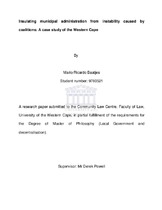| dc.description.abstract | Instability in the administration of municipalities is a particularly serious problem in the Western Cape because of its large number of coalition councils. Coalitions have led to
frequent changes in local governance and to constant changes in political and administrative leadership. Due to the fluidity in local government, the politics of the day have become synonymous with back-stabbing, secret agreements and arrangements between politicians and political parties wishing to align themselves in such a way as to gain control of the councils.1 A municipality is required by the Constitution2 to structure and manage its administration and budgets, budgeting and planning processes so as to give priority to the basic needs of the community and to promote the social and economic development of the community.3 Legislation further prescribes that “a municipality must within its administrative and financial capacity establish and organize its administration in a manner that would enable the municipality to establish clear relationships, facilitate coordination, cooperation and communication between (i) its political structures and political office bearers and its administration; (ii) its political structures, political office bearers and administration and the local community”.4 It may therefore be argued that a municipality subscribing to the abovementioned prescripts should be functioning effectively. However, in practice continuous administrative and political instability adversely impacts on a municipality‟s capacity to provide service delivery to the community. The 2006 local government elections resulted in only four out of 30 municipalities in the Western Cape having a single party with more than 50% of the seats (outright majority). The remaining 26 municipalities were governed by coalitions of two or more parties. In 2001, Parliament introduced floor-crossing legislation which allowed Members of Parliament, Members of Provincial Legislatures and local government councillors to change their political party (or form a new party) and retains their seats when they did so.5 As a result of the 2007 floor-crossing legislation, the number of municipalities with an outright majority increased to 7. Power changes continued to occur even after the 2007 floor-crossing as a result of by-election outcomes or new internal coalition arrangements. Coalition government in the Western Cape remains a reality following the 18 May 2011 local government elections: the Democratic Alliance won 12 municipalities outright, the African National Congress won 1, and in 12 municipalities there was no outright winner. Of the 12 last-mentioned municipalities, 7 municipalities produced hung municipalities, i.e. Bitou, Witzenberg, Laingsburg, Hessequa, Theewaterskloof, Matzikama and Prince Albert. | en_US |

